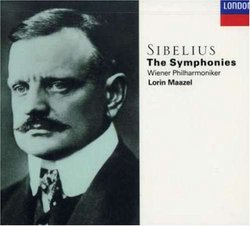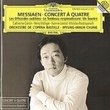| All Artists: Jean Sibelius, Lorin Maazel, Vienna Philharmonic Orchestra Title: Sibelius: The Symphonies Members Wishing: 0 Total Copies: 0 Label: Decca Release Date: 2/11/1992 Album Type: Box set, Limited Edition Genre: Classical Styles: Historical Periods, Modern, 20th, & 21st Century, Symphonies Number of Discs: 3 SwapaCD Credits: 3 UPC: 028943077828 |
Search - Jean Sibelius, Lorin Maazel, Vienna Philharmonic Orchestra :: Sibelius: The Symphonies
 | Jean Sibelius, Lorin Maazel, Vienna Philharmonic Orchestra Sibelius: The Symphonies Genre: Classical
|
Larger Image |
CD DetailsSimilarly Requested CDs
|
CD ReviewsMostly excellent performances at an unbeatable price. Augustus Caesar, Ph.D. | Eugene, Oregon United States | 12/25/2000 (5 out of 5 stars) "Jean Sibelius (1865-1957) enjoyed during his lifetime a level of adulation few composers have ever known. From roughly 1920 until the mid-40s, Sibelius, at least in Scandinavia, England and America, was revered as the world's greatest living musical genius, and his symphonies were acclaimed as the equal of Brahms' and second only to Beethoven's. His birthday is a national holiday in Finland and his 70th birthday gala was attended by the presidents of each Scandinavian country (including Denmark). His music was among the most frequently performed anywhere in the world. Winston Churchill sent him cigars. Ormandy and the Philadelphia Symphony Orchestra made a trip in the dead of the Finnish winter to visit the 90 year old Sibelius at his isolated home, Ainola, which is now a national monument. It was with the arrival of Virgil Thomson at the New York Herald Tribune in 1941, however, that the surprisingly rapid descent of Sibelius' reputation began, and it has never again come close to the heights it achieved in the first half of the 20th century.Since the 1960s, Mahler's music has claimed the place once occupied by Sibelius'. Given, Sibelius' symphonies weren't typically greeted with the near-religious awe Mahlerians feel for their Master's, but only Mahler achieved in the post-war era what Sibelius had during the pre-war. It is interesting to compare their music. Personally, Mahler and Sibelius are two of my favorite symphonists, though their approach to symphonic form and their orchestral philosophies couldn't have been more disparate. A famous conversation took place between the two in 1907 in which Mahler said the symphony should be like the entire universe, vast and all-encompassing, while Sibelius stated that he was always striving for perfection in form and flawless symphonic architecture (these aren't verbatim quotes). Their differing philosophies are reflected in their lives: while Mahler died at 50, his Tenth symphony incomplete and his life in tatters, Sibelius made peace with both the world and himself, and spent the last thirty years of his life in musical silence, while the world awaited an Eighth symphony that never materialized. Clearly, after the revolutionary Seventh symphony, Sibelius had said all he had to say. Which brings us to Lorin Maazel's cycle of Sibelius symphonies. Many love Colin Davis' justifiably praised cycle with the BSO, but for me, Maazel's is the finest Sibelius cycle. Maazel was young when he recorded these (in his early- to mid-30s), but his interpretations are mature, penetrating and often deeply moving. These recordings range from good to superb, with Maazel's First, Second, Fourth, Sixth and Seventh standing out as absolutely first-rate. The recordings of the Third and Fifth are good, but (for me) don't reach the rarified heights of the others. All in all, this is an excellent Sibelius cycle and the price is amazing. Whether you already love Sibelius' symphonies or have never heard any of them, you won't regret owning this set. Highly recommended." PERFORMANCES WITHOUT PEER Melvyn M. Sobel | Freeport (Long Island), New York | 07/25/2000 (5 out of 5 stars) "I cut my teeth on this set some 30 plus years ago, when first released by London Records in a nifty slipcase, and my affection and admiration for it have never dwindled. At its budget CD incarnation, I rejoiced in disbelief, and with good reason. As an integral collection of the seven Sibelius symphonies, this set simply has no equal in today's market. The penetrating and provoking interpretations of Maazel, startling and consistently thrilling performances by the VPO, and the absolutely incredible London "sound," made all the more immediate by CD transfer, simply make this set elemental, essential and definitive. For little more than the cost of one full-priced CD, you can own this visionary (nay, legendary) set. You can span the years (and even the centuries, now) with Sibelius and Maazel as your guides. [Running time--- CD 1: 69:00 CD 2: 69:42 CD 3: 73:17] " Exhilarating Sibelius recordings MR P FITTON | Oldham, Manchester UK | 02/15/2004 (4 out of 5 stars) "Having bought supposedly "legendary" and "landmark" Sibelius recordings before and been sorely disappointed, I must confess to having misgivings as soon as I'd pressed the 'order' button for this set. Would all the praise turn out to be the usual hyperbole? I shouldn't have worried...There's a real sense of excitement in these recordings and they are full of vitality and character. The Vienna players bring obvious enthusiasm and drive to these wonderful works but there's great subtlety and a deep understanding of the music too. So much so that just hearing them play the 1st (a performance that crackles with an energy that matches the vitality and invention of the writing) reminded me of the awe I felt when I first discovered Sibelius several years ago, and I don't think any CDs I've bought since my first purchase of these symphonies has had that effect. I'd agree with most in saying that the highlights are the 4th and 7th - the latter performance really capturing the epic sweep and intense beauty of this masterpiece. In passing, is there anything more sublime in all music than the first 10 minutes or so of Sibelius' 7th (and the remaining 10 minutes are pretty good too)? The 1st and the 5th deserve very high praise as well. The 5th is a work I've always admired more than enjoyed but this account grips me from the first note to the last chord. I gather that true aficianados of the 5th have reservations about it, however. Sadly, the 6th is a big disappointment: after a very beautiful opening section it's ruined by very fast tempi in the inner movements and some very rough-hewn playing, and sound, indeed. The first movement of the 3rd is also taken at breakneck speed but still manages to be a rewarding performance.True, the '60s sound is a bit on the bright side, very occasionally even coarse, and the discs are not completely free of muddled playing and even a little questionable intonation, but these are rare blemishes so don't be put off. You can hardly go wrong at this price anyway, can you? My only caveat would be that I wouldn't really recommend this as your only source of these symphonies - some of the performances are a bit idiosyncratic by current standards for that. Get some good modern recordings as well. For very little money you can't beat Adrian Leaper's superb cycle on Naxos or indeed his later recordings for Arte Nova; both of these contain 7ths that - sorry, purists - leave even Mr Maazel's in the shade. Petri Sakari, also on Naxos, is a good bet too, if a little over praised. But do invest in this excellent little box."
|

 Track Listings (8) - Disc #1
Track Listings (8) - Disc #1

